In the past, the area was part of the Bắc Sơn - Võ Nhai resistance base, and it was also the cultural cradle of the ancient Vietnamese. Today, the district has become an attractive ecological community-based tourist area in Lạng Sơn Province.
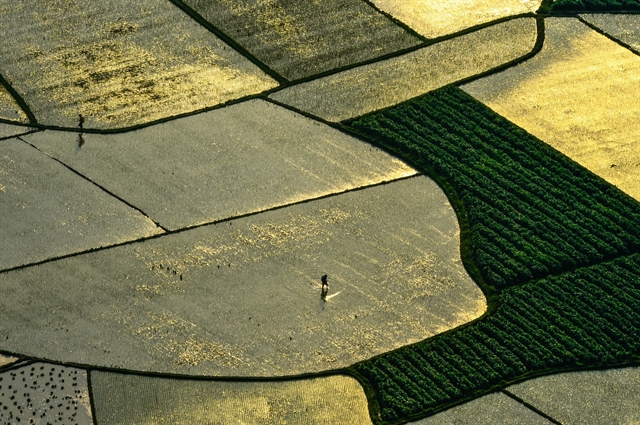
Bắc Sơn field looks like a giant 'brocade'. — VNS Photo Nguyễn Sơn
Lâm Giang
Nestled among the rolling limestone mountains, Bắc Sơn Valley, a district of Lạng Sơn Province, appears as a majestic natural picture with many historical relics, scenic spots, charming mountains and beautiful landscapes.
In the past, the area was part of the Bắc Sơn – Võ Nhai resistance base and it was also the cultural cradle of ancient Việt Nam. Today, the district has become an attractive ecological community-based tourist area in Lạng Sơn Province.
One of the highlights not to be missed when visiting this destination is Bắc Sơn, which appears like a giant 'brocade' with colourful rice fields, alternating between ripe rice, green rice and newly transplanted rice fields.
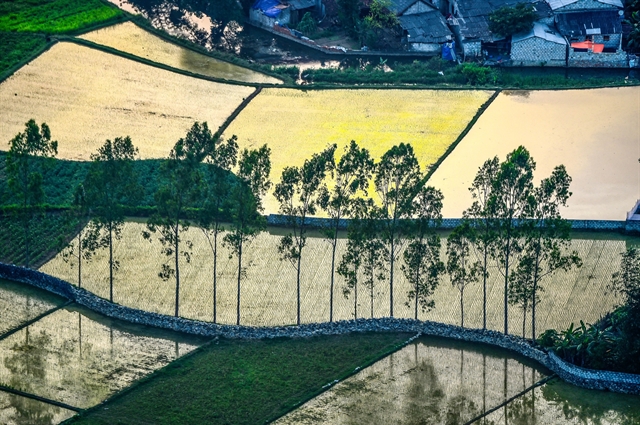
Bắc Sơn has endless ribbons of flat rice fields. — VNS Photo Nguyễn Sơn
In addition, the district has many revolutionary historical areas and sites, unique landscapes, and indigenous cultural values of the Tày, Nùng, Kinh, Dao and Mông people. Particularly, the district's Ná Nhèm Festival (Trấn Yên Commune) has been recognised as a national intangible cultural heritage site.
About 90km from Lạng Sơn City centre, Hoan Trung Community-based Tourism Village in Chiến Thắng Commune, with poetic scenery and many unique cultural activities, has become an attractive destination for tourists. It is nestled amidst limestone mountains and fruit-laden mandarin and custard apple gardens.
This is home to 127 households, most of whom are Tày people. Most of the villagers' income comes from farming and growing fruits, such as apples and tangerines.
In September 2021, the village was recognised as a community-based tourist site, marking a new beginning and a firm foundation for the local hospitality sector. Tày people in the village have successfully preserved their ancestral cultural heritage. Visitors to the village are invited to stay with locals in traditional houses on stilts, where they can learn the customs, experience the daily life of the Tày people, sample traditional cuisine, and enjoy the beautiful 'Then' singing performances.
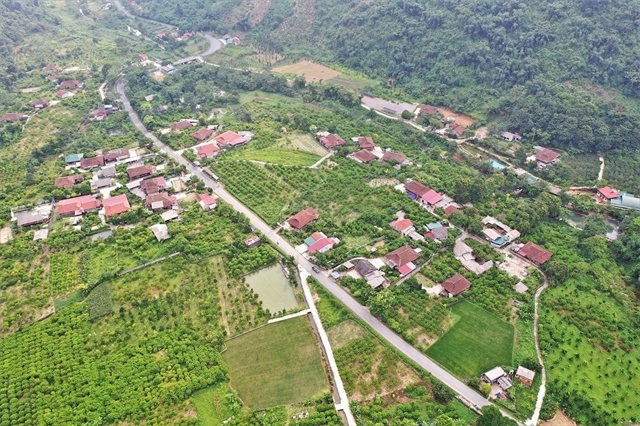
An aerial view of Hoan Trung Community-based Tourism Village in Chiến Thắng Commune, Bắc Sơn District. — Photo dttg.baotainguyenmoitruong.vn
They can also visit the Mỏ Mắm Stream and explore Keng Tao Cave, which are two famous tourist attractions of Bắc Sơn. Each site welcomes around 5,000-6,000 visitors each month.
Heading out along the one kilometre Mỏ Mắm Stream, tourists will reach Keng Tao Cave. Inside the 300m cave boasts a diverse system of natural stalactites and the deeper you go inside, the larger the cave expands, with a very cool temperature.
Also located in Chiến Thắng Commune, just a few kilometres from Hoan Trung Village, is the attraction of Hú Cave Tangerine Garden. The two hectare garden is located in the heart of a mountain and has around 500 tangerine trees, which become ripe from the end of September to November every year.
Another favourite destination in Bắc Sơn is Nà Lay Peak. With a height of more than 600m above sea level, the trekking journey is not too difficult for those who love nature and travel and will take tourists about one hour to reach the top.
To get to the summit, visitors have to cross about 1,200 steep stone steps but it is worth the effort.
Standing on Nà Lay Peak, visitors feel like they are lost in a fairyland with majestic and poetic natural scenery. Their eyes can take in the vast view of the shiny golden rice fields, the gently winding stream and the village hidden in the mist.
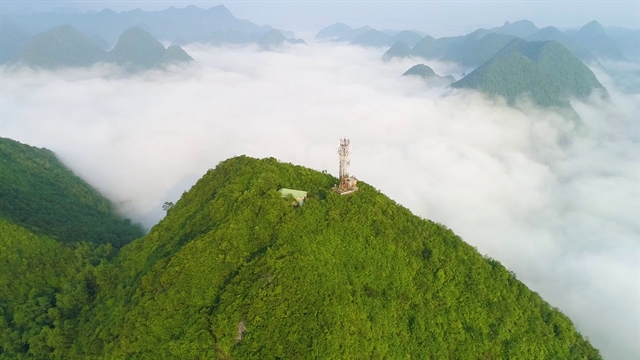
Standing on Nà Lay Peak, visitors feel like they are lost in a fairyland with majestic and poetic natural scenery. — Photo dulichlangson.com.vn
Tam Canh Pass, which is located in the Bắc Sơn uprising relic area, is known as the most poetic pass of the northeast region. This place was recognised as a special national monument in 2016.
With a winding length clinging to the side of the huge mountainside, Tam Canh Pass promises to bring visitors exciting backpacking experiences.
Meanwhile, Khuôn Bồng Cave located in Vũ Lễ Commune has wild and exciting beauty and is around ten kilometres long. This place is like a mysterious world hidden in the heart of limestone mountains, possessing countless shimmering, rare and magical stalactites.
Having advantages in climate, natural landscape and ethnic cultural identities, in recent years, Bắc Sơn District has focused on putting in place solutions to effectively implement tourism development projects, aiming to turn tourism into a key economic sector, contributing to creating sustainable livelihoods for people here.
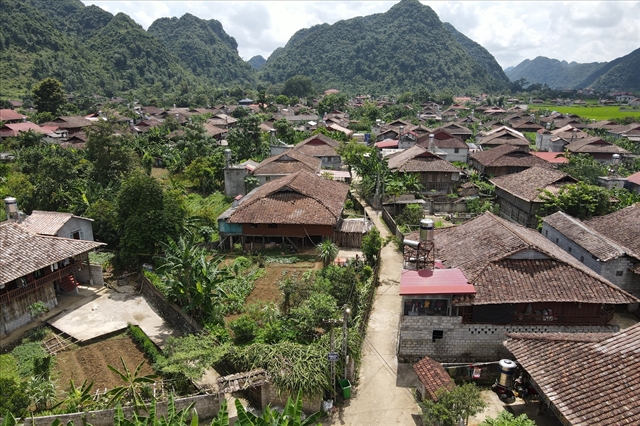
The stilt house architecture of the Tày people in Quỳnh Sơn Community-based Cultural Tourism Village is always attractive to tourists to explore and experience. — Photo baodantoc.vn
Currently, the District People's Committee is focused on building the Quỳnh Sơn Community-based Cultural Tourism Village into tourist destination meeting ASEAN standards.
It has reviewed and registered five homestay households to be part of the offer.
Bắc Sơn District has ten tourist destinations, including three community tourism destinations (Quỳnh Sơn, Vũ Lăng, and Hoan Trung), three eco-tourism destinations and four historical and cultural tourist destinations, attracting many tourists every year and contributing to local socio-economic development. — VNS